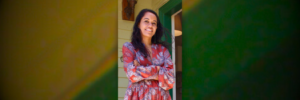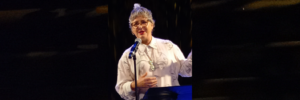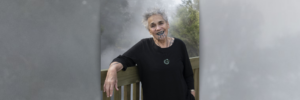
Ruby Solly (Kāi Tahu, Waitaha, Kāti Māmoe) is a writer, musician and taonga pūoro practitioner living in Pōneke. Her first book of poetry, Tōku Pāpā, was published in 2021 and longlisted for the Ockham New Zealand Book Awards. Her second book, The Artist, is published in 2023. She has had poetry published in Aotearoa, Australia, America and Antarctica. In 2020 she released her debut album, Pōneke, and in 2021, Bird Like Men, as part of the group Tararua. She is currently completing a PhD in public health, focusing on the use of taonga pūoro in hauora Māori. Her much anticipated second pukapuka, The Artist was released earlier this month by Te Herenga Waka Press.
Congratulations on the launch of The Artist. What can you tell us about this book? Who should be reading it and who is it written for?
Gosh, he pātai nunui! He pātai hohonu hoki! Ekari, he pātai pai. I think I always primarily write for my whakapapa, in all its directions. I wrote to my ancestors and to my mokopuna who are yet to receive the gifts of these lands and their tīpuna. But also I wrote this book for Waihao, and for all of us Southern Māori of Kāi Tahu, Waitaha and Kāti Māmoe. And I think I wrote it for people who feel more understood by that whenua and all that lies within it than they do by other people. It’s a book that’s hugely about communication and how in te ao Māori we have methods of communication that remove barriers of time and space. I think most people could get something from this book, and if they didn’t get anything, well, they probably weren’t looking properly. The first kōrero in the book converses the history of Te Wai Pounamu from the beginning of our time till the settlement, which I think is valuable knowledge for all who walk that land.
What tikanga or kawa do you apply to your writing process?
I wrote a little writing karakia around this book that included some of the atua featured, just something for me to say as I went to write. I also did a lot of research for years before settling down to write. I was researching while I was writing my first book, this one has been a long journey. I think tikanga for me as well was being able to fact check kōrero with whānau and experts, and being able to reframe kōrero from more colonial books. There were some self-care style practices too where I was writing more difficult scenes, and just recognizing and writing love back in at other points to whakatau, and to balance the world of the book too.
What do you think your tīpuna would think of your book? What would their reactions be?
This keeps me up at night occasionally! But I think in that all-knowing sense that our tīpuna have, they would be proud at how I’ve been able to take my writing home to the South and how I’ve been able to take them with me. I think looking back to our recent tipuna can take a lot of empathy because they were forced through the colonialism machine just to survive and guarantee basic rights. And I see being able to live freely in te ao Māori as being able to give them what they didn’t have, from within myself. And it feels good…. And if it feels good to me, it must feel good to them too.
This is the second book you’ve brought into Te Ao Mārama. What was the process like this time around, compared to your debut poetry collection?
This was incredibly different and I found it so much harder. My last book, ‘Toku Papa’ focused on my relationship with my Dad which made it quite emotionally challenging to write, but my Dad creates these strange kind of poetic situations, so it was often just documenting him and us and our trajectory. Whereas this book was creating a whole world, or a world within the South, making characters, and thinking about how it’s all going to come together. Kind of like script writing meets poetry writing from what I’ve experienced of the two. I found writing the few sex scenes in it super embarrassing because I’m such an awkward little guy, I think that was the hardest bit!
As well as being a fantastic writer, you’re also completing a PhD, you are a well-respected musician and taonga pūoro practitioner – all in addition to your day job. What advice do you have for other kaituhi Māori on how to navigate being so busy and still being able to dedicate time to writing and other art forms?
This is hard because I don’t think I always do this well! I think being able to say no, while still keeping things open or offering things you can do, are really good skills to have. Also, don’t underestimate phoning a friend! I have a friend that I phone whenever I’m not sure about payment and what I’m worth. I’ve got another I talk through ethical issues with, another about where my mental health is at and if I can achieve a job or not in my current state. Use phone a friend! And you’ll become a phone a friend in return, it builds community and gives you access to a bigger range of support and skills. Pomodoro method is also my go-to. I’ll go hard for twenty minutes, then break for 5 (often a poi break to keep things moving) then back in, if you do that for two hours instead of just sitting at the computer popping on and off socials or other things, it’s amazing how much you can get done, even when you’ve only got twenty minutes or so. ALSO (sorry I’m passionate about organising time), have a notebook or write short versions of what you want to write later when you have time. I call it “just add water” writing and it’s the busy wāhine Māori’s secret weapon (as well as voice messages and glamorous shawls).
If you had to make a soundtrack to accompany The Artist, what would be on the playlist?
I totally had a playlist while working on this book that featured a lot of classical music and taonga pūoro, because I wanted it to sound like the landscape within the story. Michael Nyman’s soundtrack for ‘The Piano’ got a lot of play, also the soundtrack for ‘Cave of Forgotten Dreams’ (a must listen, and a must-see film for rock art fans!).
I’m also hoping to do an event reading the book aloud with live pūoro later in the year, so you can hear it almost like an instrument in the context of our sounds.
You were also the ringatoi for the striking cover art for The Artist. How did the idea evolve for you to create your own cover, and what was that like to negotiate with your publisher?
We had a few other ideas but they didn’t pull through so it was more an “Oh ok, I’ll have a go”. But I actually really enjoyed the process and was able to weave through so many tohu from the book into the cover and back cover (that actually began as the first cover design!). Being able to use kōkōwai within the cover art was a huge advantage of working myself too as it felt like an extension of the book and its kaupapa. I think one of the biggest advantages of creating in te ao Māori is that mahi toi is interconnected and vast. I definitely encourage other Māori writers to play with other mahi toi to bring things out in their book, or to help them process! I did a lot of work with whenua, pigments, paint, and making brushes etc while I wrote this book so I could write that knowledge into my characters, and it brought me so much more.
What are your dreams for this book?
I’m a strange little depressed creature. I never really have dreams for anything really! But I found one of our pōua, Gerry Te Kapa Coates’, book in a second-hand book shop once, and through that I was able to trace my whakapapa and find that I was related to him and also Arihia Latham Coates whose book, ‘Bird Speak’ is coming out this year too! I think if in many years one of my mokopuna, or a distant relation, found that book and got to be told about their iwi and mahi toi through my words, I’d be absolutely stoked.
What tips do you have for building relationships in the Māori writing community?
Be kind. Be staunch. Stay away from the drama unless you have the strength to move it or resolve it, and know that doing so will bring you and the community peace. Look and see who needs help, and aunty them HARD. Take your iwi whānaunga with you. Recognise that publishing isn’t the only reason to write.
Which book by a Māori author have you read lately that you loved and what did you love about it?
We are so lucky to have so many around at the moment! I feel like the world of ‘Tauhou’ by Kotuku Titihuia Nuttall is such a beautiful place for me to go within my brain when the world feels unsafe and destructive. It’s such a beautiful book that acknowledges the whakapapa of the world we have now, but also gives so many moments of both indigenous and queer joy.
What advice do you have for emerging Māori writers?
Be yourself, we need all the different kinds of Māori voices we can get. Meet your community, and if you’re writing about something iwi specific, bring them with you. Books are never an individual effort, they are a choir, not a soloist. And the more voices within your work, the stronger it will be and further it will go.
Photo credit: Ebony Lamb




